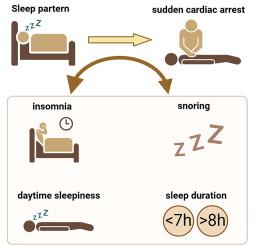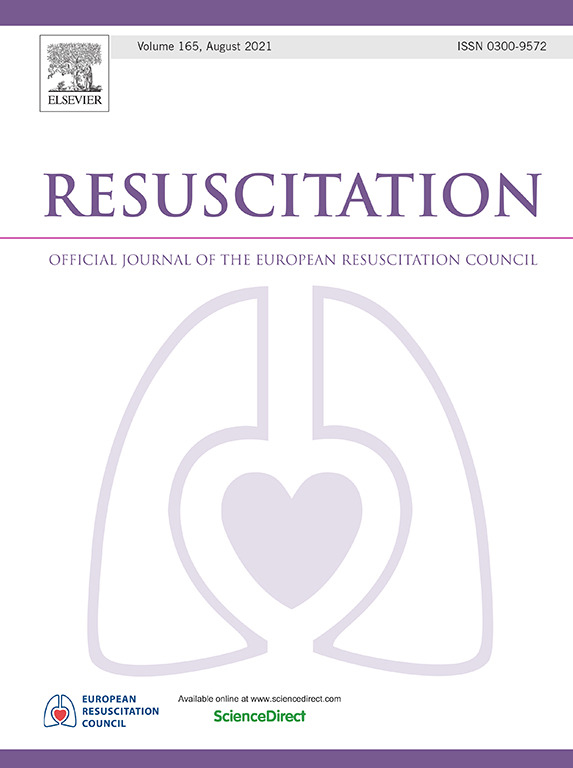Association of healthy sleep patterns with incident sudden cardiac arrest: a prospective study of 414,625 UK biobank participants
IF 4.6
1区 医学
Q1 CRITICAL CARE MEDICINE
引用次数: 0
Abstract
Background and Objective
The relationship between healthy sleep patterns and the risk of incident sudden cardiac arrest (SCA) remains underexplored.
Methods
In this prospective cohort study, data from 414,625 participants in the UK Biobank (UKB) were analyzed. Sleep patterns were assessed using a composite sleep score incorporating five sleep behaviors: sleep chronotype, sleep duration, insomnia, snoring, and daytime sleepiness. The association between sleep patterns and incident SCA was evaluated using Cox proportional hazards models.
Results
Over a median follow-up of 13.93 years, 2545 incident SCA cases were identified. In the fully adjusted Model 3, participants with sleep scores of 4 or 5 had a 19 % [Hard ratio (HR) = 0.81; 95 % Confidence interval (CI): 0.65–1.00] lower risk of SCA compared to those with sleep scores of 0–1, and each one-point increase in sleep score was associated with a 5 % reduction in SCA risk. Restricted cubic spline analysis demonstrated a dose–response relationship between sleep scores and SCA risk, with no evidence of nonlinearity. If all individuals adhered to an optimal sleep score of 5, the incidence of SCA may potentially be reduced by 17.11 %. Notably, the association between sleep scores and SCA risk was more pronounced in individuals younger than 60 years at baseline and those without chronic conditions such as coronary heart disease, hypertension, stroke, or cancer. Additionally, sleep duration, insomnia, and snoring showed significant genetic correlations with SCA.
Conclusion
Healthy sleep patterns are associated with a significantly reduced risk of SCA, particularly among individuals younger than 60 years without cardiovascular disease, cerebrovascular disease, or cancer.

健康睡眠模式与突发心脏骤停的关联:一项414625名英国生物银行参与者的前瞻性研究
背景与目的:健康睡眠模式与心脏骤停(SCA)发生风险之间的关系尚不清楚。方法:在这项前瞻性队列研究中,分析了来自英国生物银行(UKB)的414,625名参与者的数据。睡眠模式通过综合睡眠评分进行评估,该评分包含五种睡眠行为:睡眠时间类型、睡眠持续时间、失眠、打鼾和白天嗜睡。使用Cox比例风险模型评估睡眠模式与SCA事件之间的关系。结果:在13.93年的中位随访中,确定了2545例SCA事件。在完全调整后的模型3中,睡眠得分为4分或5分的参与者有19%[硬比(HR) = 0.81;95%可信区间(CI): 0.65-1.00)与睡眠评分为0-1的患者相比,SCA风险较低,睡眠评分每增加1分,SCA风险降低5%。限制性三次样条分析显示睡眠评分与SCA风险之间存在剂量-反应关系,无非线性证据。如果所有人都坚持5分的最佳睡眠评分,SCA的发病率可能会降低17.11%。值得注意的是,睡眠评分与SCA风险之间的关联在基线年龄小于60岁的个体和没有慢性疾病(如冠心病、高血压、中风或癌症)的个体中更为明显。此外,睡眠时间、失眠和打鼾与SCA有显著的遗传相关性。结论:健康的睡眠模式与SCA风险显著降低相关,特别是在60岁以下无心血管疾病、脑血管疾病或癌症的个体中。
本文章由计算机程序翻译,如有差异,请以英文原文为准。
求助全文
约1分钟内获得全文
求助全文
来源期刊

Resuscitation
医学-急救医学
CiteScore
12.00
自引率
18.50%
发文量
556
审稿时长
21 days
期刊介绍:
Resuscitation is a monthly international and interdisciplinary medical journal. The papers published deal with the aetiology, pathophysiology and prevention of cardiac arrest, resuscitation training, clinical resuscitation, and experimental resuscitation research, although papers relating to animal studies will be published only if they are of exceptional interest and related directly to clinical cardiopulmonary resuscitation. Papers relating to trauma are published occasionally but the majority of these concern traumatic cardiac arrest.
 求助内容:
求助内容: 应助结果提醒方式:
应助结果提醒方式:


